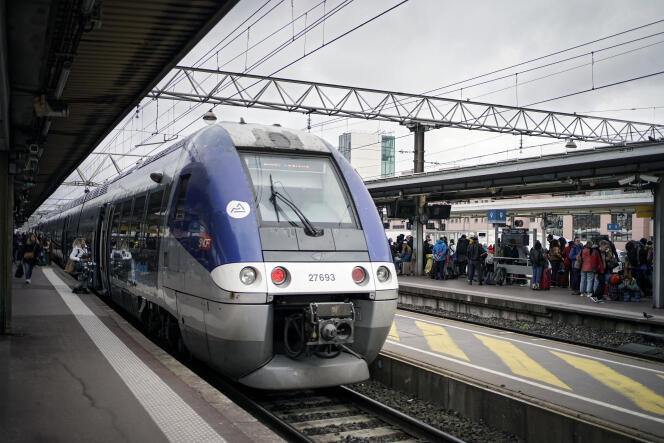


Has the never-ending "rail pass" story finally come to an end? After the official agreement reached on April 3 between French regions and Minister Delegate for Transport Patrice Vergriete, the one-way ticket program for TER (regional express trains), Intercités (trains between large cities) and urban transport seems to be on track. Well, almost...
Over the last few days, discussions have intensified between representatives of the regions – most of whom are disappointed by the final form of the project – and a ministry that is still groping its way through the implementation process.
On September 4, 2023, Emmanuel Macron was the guest of YouTuber Hugo Travers for a long-form program devoted to youth. Asked about the German "D-ticket" and a possible French equivalent, the president said "banco," ("you're on") as he pointed out in a tweet published on April 3.
On paper, the idea is simple: for €49 a month, young people under age 27 will be able to buy a one-way ticket at the beginning of June, giving them access from July 1 to August 31 to TER, Intercités and urban transport, excluding Ile-de-France, the Paris region. The SNCF (France's national railway company) predicts 700,000 sales. That's 10 times more than the "Pass jeune TER" ("TER youth pass") offered in 2020-2021.
The only region to be excluded from the program this summer, Ile-de-France will nevertheless remain an arrival and departure destination. A TER train from Paris to Lyon, for example, will be totally free with the "rail pass." The same applies in the opposite direction. However, it will be necessary to purchase a Navigo pass to travel on Ile-de-France transport. According to the Ministry of Transport, this exception can be explained by "technical difficulties," a "particular ticketing system" and "deadlines that are too short." They confirm, however, that if the experiment is extended to 2025, the Paris region will be included.
Taken as a model, the Deutschlandticket is more extensive. Since May 1, 2023, the "D-Ticket" subscription has enabled every German to travel on all regional and city networks, all year round, for €49 a month. A student version, at €29.40, was launched in spring 2024.
Almost six months passed between the president's message and the official announcement on April 3 by Minister Delegate Vergriete. The cause? A new government and a "concept that looks simple on paper, but in practice [is] always more complicated," according to Thibaud Philipps, in charge of transport for the Grand-Est region.
The "rail pass" aims to bring together the TER, managed by the regions; the Intercités, managed by the French state via the SNCF; and the 170 urban transport operators spread across France. Built on back-and-forth discussions and negotiations, the project is considered "very ambitious" by the newly-installed government, which acknowledges that several details have yet to be "specified" due to "tight deadlines." On the ground, no one is being fooled, like the Nouvelle-Aquitaine region: "It seems extremely complicated to set up technically, especially for the beginning of June," warned Renaud Lagrave, vice president of the regional council.
The Normandy, Hauts-de-France and Auvergne-Rhônes-Alpes regions in particular pointed to this hasty implementation. To the very end, the regional presidents negotiated compensation for the loss of revenue, estimated by the SNCF at €15 million over two months. The state will take on 80% and the regions 20%.
Contacted by Le Monde, the ministry, the SNCF and the regions all expressed that they are still figuring out their path forward. Even though the "rail pass" will be introduced in digital form, the points of sale have yet to be defined. Will it be the SNCF Connect, Trainline or Kombo booking sites? "It all depends on their IT developments, and their links with the various operators and the regions," the ministry told Le Monde. Once purchased, this one-way ticket will be issued in one particular name. Reservations are expected to remain compulsory on the transport services concerned.
What about controls? Will proof of age be required? The ministry's answer: "We don't know yet." The same applies to the timetable: Will the pass be valid from the 1 to the 31 of the month, or will it be adaptable according to the day of purchase?
All that remains now is to convince young people to buy the "rail pass." The president's office admitted that it has "not yet thought through" its communication strategy. However, reaching this audience seems essential if the program is to be sustained and expanded.
Yes. Firstly, on a technical level, the concept simplifies a system that is currently designed on a case-by-case basis: Each of France's 13 regions has its own offers and advantageous fares for its TER trains, particularly for young people.
Simplification also applies to prices, which vary from region to region. In the Centre-Val-de-Loire region, for example, a €20 annual pass for 12 to 25 year olds halves the price of coach and TER tickets. In Normandy, a €30 annual offer gives access to the network for a quarter of the price during the week and half the price at weekends, with no age limit. In Auvergne-Rhônes-Alpes as in Hauts-de-France, discounts of 50% on local TER tickets and beyond are offered to under-26s. But when it comes to unlimited-journey cards, prices systematically soar above €100 per month.
Each urban area also offers its own urban transport network (metro, tramway, bus or ferry) with varying fares. All should be standardized (and free) with the "rail pass" in your pocket.
Translation of an original article published in French on lemonde.fr; the publisher may only be liable for the French version.
